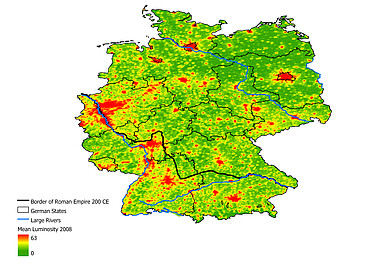
Project Description
What determines the prosperity of cities and regions? Which historical factors are important to understand historical and current differences in regional development levels in central Europe? What role played political institutions, trade activities and the financial sector? Are there factors explaining the observed persistence in the fate of regions and cities? Is Roman heritage (Roman roads and cities) of the southern part of Germany responsible? Did medieval trade activities shape the contemporary spatial agglomeration and industry concentration patterns in central Europe via their impact on forming core and periphery regions? How successful targeted regional policy measures, like the introduction of savings banks in the 19th century can be in fostering industrialization of remote areas? These are typical questions asked in this long-term research project of our institute. It is found that usually, there is a high persistence in regional development levels that is explained by historical factors dating back as long as Antiquity. However, we also found that public policy or trade activities---and hence factors that could be influenced by human actions- can decisively change the fate of regions.
In future, it is planned to switch the focus of the research in this area away from cities to the rural areas and the village. Historically, most people lived in villages in the countryside where they engaged in agricultural activities. Yet, almost nothing is known about the determinants and consequences of e.g., different village structures, organization of the rural economy or agricultural inheritance rules. These aspects will be the major concerns of future research in this project.
Involved Researchers
Fabian Wahl (fabian.wahl@uni-hohenheim.de)
Sibylle Lehmann-Hasemeyer (sibylle.lehmann@uni-hohenheim.de)
Project-related Publications
Wahl, F. (2018). Political Participation and Economic Development. Evidence from the Rise of Participative Political Institutions in the Late Medieval German Lands, European Review of Economic History, forthcoming.
Lehmann-Hasemeyer, S. and Wahl, F. (2017). Savings Banks and the Industrial Revolution in Prussia. Supporting Regional Development with Public Financial Institutions. CEPR Discussion Paper No. 12500.
Wahl, F. (2017).Does European Development Have Roman Roots? Evidence from the German Limes. Journal of Economic Growth, 22(3), 313--349.
Wahl, F. (2016a). Does Medieval Trade Still Matter? Historical Trade Centers, Agglomeration and Contemporary Economic Development. Regional Science and Urban Economics, 60, 50--60.
Wahl, F. (2016b). Participative Political Institutions in Pre-Modern Europe. Introducing a New Database. Historical Methods. A Journal of Quantitative and Interdisciplinary History, 49(2), 67--79.
Wahl, F. (2016c). Origins of Political Change. Structural vs. Exogenous Factors as Cause of the Late Medieval Guild Revolts. Mimeo
